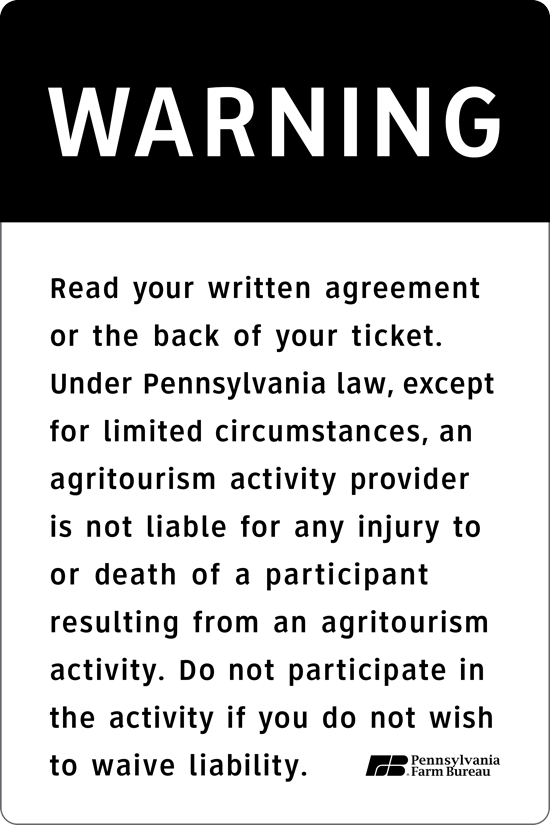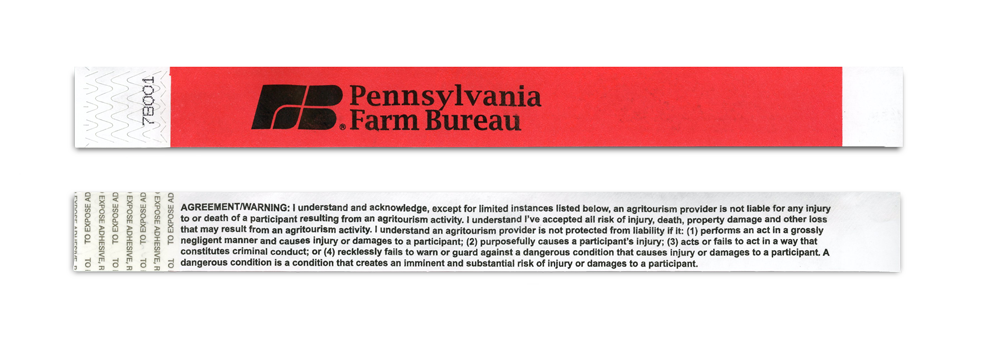Agritourism Liability

In June 2021, Gov. Tom Wolf signed legislation to limit civil liability for farms engaged in agritourism. Pennsylvania Farm Bureau’s advocacy leadership played a key role in securing this long-sought victory for Pennsylvania agriculture.
The new law, Act 27 of 2021, gives agritourism operations reasonable protection from lawsuits arising from circumstances beyond their control. However, there are certain steps agritourism operators must take to receive this protection. PFB has signs available for purchase, along with wristband tickets, that meet the requirements of the new law and has put together a helpful guide to help agritourism operators ensure they are taking the proper steps to ensure they are protected.
See the guide below for guidance on using the signs in conjunction with a warning message printed on tickets.
PDA Hayride Attraction Regulation
Agritourism Law Webinar with PFB’s Joe Montenegro and Penn State Law’s Brook Duer
How can I get signs?

Signs are compliant with the sign posting requirements of Act 27 and cost $65 each plus shipping.
The 24-inch by 36-inch signs are constructed from .040 aluminum and have ¾-inch, rounded corners.
They are waterproof and UV safe and are guaranteed to last a minimum of five years and not rust.
How can I get wristbands?

Outside (top) displays PFB logo and inside (bottom) of band displays visitor agreement.
Wristbands are compliant with Act 27 and cost 4.9 cents each plus shipping.
The 1″ x 10″ wristbands are made from Tyvek® and include the necessary legal disclaimer, in the correct font size and bold type, on the back.
To order, please contact Blake Barrick at bvbarrick@pfb.com or 717-731-3512.
How to Comply with Pennsylvania’s Law Limited Civil Liability for Agritourism
Act 27 of 2021 has created legal protections for farmers that host agritourism events and activities on their farms. This law is based on similar protections that have been adopted in 26 other states around the country. Protecting agritourism businesses from frivolous lawsuits has been a chief legislative priority for Pennsylvania Farm Bureau and we are grateful for the support the General Assembly and Gov. Tom Wolf gave to this legislation.
Act 27 takes effect on August 29, 2021. There are steps that farmers must take in order to receive protection under Act 27. Failing to do so will leave farmers with no protection under this law. It is important that farmers understand there are steps they must take to be in compliance with Act 27.
This document is intended to answer common questions that you might have to better understand Act 27 and how to comply. We highly recommend working with your insurance carrier on the best way to adjust your business to comply.
What is covered by the agritourism civil liability law?
Agritourism providers are protected from injuries that occur due to circumstances beyond their control. The law defines agritourism as:
“a farm-related tourism or farm related entertainment activity that takes place on agricultural land and allows members of the public, whether or not for a fee, to tour, explore, observe, learn about, participate in or be entertained by an aspect of agricultural production, harvesting, husbandry or rural lifestyle that occurs on a farm.â€
This broadly covers many of the common agritourism activities, such as corn mazes, pumpkin patches, pick-your-own activities, but also other farm-related entertainment activities like hay bale forts, etc. If farmers make efforts to routinely inspect their grounds, machinery, equipment that is used in activities, they will go a long way to shielding themselves from potential legal actions.
What is NOT covered by the agritourism civil liability law?
Civil immunity is NOT provided to the following activities:
1) overnight accommodations
2) weddings
3) concerts
4) food and beverage sales
Obviously, these activities are often incorporated as part of an overall agritourism business, but the law draws a bright line by not extending protections to these particular activities. Just because food and beverages are served as part of an agritourism business does not mean the whole farm isn’t covered by Act 27. For instance, if you sell food and drinks at your agritourism business, you would not be covered under this act should someone claim they were sickened by food or drinks. However, you would be protected if someone claims they were injured by tripping and falling in a corn maze located on the property. Similarly, while the overnight accommodations at a farm stay would not be protected by the act, your business would receive protection under the act should overnight guest be injured at an activity on the farm, such as taking part in a petting zoo.
Am I protected from every incident that could happen on my farm?
No. The law stipulates that certain incidents will not have legal protections. Agritourism businesses are not protected if their actions constituent criminal conduct or purposefully cause someone’s injuries. Additionally, an agritourism business is not protected if they, or their employee, act in a grossly negligent manner that results in injury or damages. Gross negligence is a legal standard involving an “extreme departure†from the standard of care owed to another person. Generally, property owners owe customers a duty to maintain the property in a reasonably safe condition and to either repair or warn of any dangerous conditions on the property that the owner knows, or should know, exist. Ultimately, whether an action is a “extreme departure,†as opposed to an “ordinary departure†is a factual question for the jury or judge, but an example may involve operating a tractor at a high rate of speed while pulling a hay wagon filled with visitors on their way to a pumpkin patch. Lastly, an agritourism business is not protected if they recklessly fail to warn or guard against a dangerous condition that could cause an injury. Similar to gross negligence, recklessness is a legal standard that involves a conscious disregard or intentional indifference of the risk posed to another. For instance, someone providing a visitor with a ladder to pick apples that they knew had several broken rungs would likely constitute recklessness. While the Act’s protection is not absolute, farms that follow a routine maintenance and inspection protocol will likely discover hazards and address them before an injury could occur.
What do I need to do to comply with the law?
There are two important notices that you must give visitors: visible signs and written waivers. Both are discussed below:
Signs
Act 27 stipulates that agritourism businesses must post multiple warning signs at a clearly visible location—either at or near each entrance to the farm, or at the site of each agritourism activity. The signs must be at least three feet by two feet in dimension and state the following:
“WARNING: Read your written agreement or the back of your ticket. Under Pennsylvania law, except for limited circumstances, an agritourism activity provider is not liable for any injury to or death of a participant resulting from an agritourism activity. Do not participate in the activity if you do not wish to waive liability.â€
Waiver
Act 27 requires that agritourism businesses obtain a waiver from participants. This can be accomplished in one of two ways: either through a signed agreement, or language printed on the back of an admission ticket. Visitors are required to sign before participating, parents/guardians need to sign for minors and the document must have the following language in at least 10-point bold type:
“AGREEMENT AND WARNING: I understand and acknowledge that, except for limited circumstances listed below, an agritourism activity provider is not liable for any injury to or death of a participant resulting from an agritourism activity. I understand that I have accepted all risk of injury, death, property damage and other loss that may result from an agritourism activity. I understand that an agritourism activity provider is not protected from liability if the provider: (1) Performs an act in a grossly negligent manner and causes injury or damages to a participant. (2) Purposefully causes a participant’s injury. (3) Acts or fails to act in a way that constitutes criminal conduct. (4) Recklessly fails to warn or guard against a dangerous condition that causes injury or damages to a participant. A dangerous condition is a condition that creates an imminent and substantial risk of injury or damages to a participant.â€
Agritourism businesses also have the option of putting substantially the same language on the back of admission tickets.
The waiver requirement seems like a hard one to meet
Written waivers provide businesses with an excellent level of protection. By signing a waiver acknowledging they understand a risk, visitors have substantially reduced their ability to successfully bring a legal challenge against a business. That being said, there is an understanding that having visitors sign a document before taking part in activities might be logistically difficult. That is why the law gives you the flexibility to put language on the back of a ticket. A ticket should be considered anything that is used to gain entry to your facility (like a wrist band). That being said, agritourism businesses might need to change some of their entry policies to fully comply with the law.
I host school groups. What should I do with waivers?
It is highly recommended that agritourism businesses work with either classroom educators or district staff to make sure that waivers are sent home to parents well before they visit your farm, and are required for each student to gain entry to your farm on the day of the event. Many school districts are accustomed to dealing with participation permission slips and waivers for field trips.
Will all of this prevent me from getting sued?
No. For the most part, there is no law in Pennsylvania that unquestionably prevents a party from filing a lawsuit. HOWEVER, the presence of this law presents several important protections. First, a personal-injury attorney engaged by an agritourism visitor would have to determine if any of the Act’s previously discussed exceptions apply, and relatedly, if the case is financially viable on a contingent-fee basis where the attorney generally does not get paid unless their client receives financial compensation. Second, the signed waiver or ticket is an acknowledgment by the participant that any injury or mishap could occur and they have willingly accepted that risk. Lastly, this law gives a legal defense that your attorney can work with to potentially resolve the case in a more timely and efficient manner.




